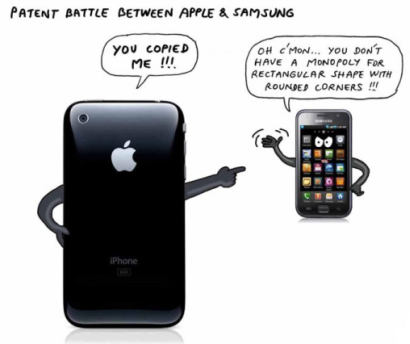
The
Nation, Thailand
[Click for More Cartoons]
Apple vs. Samsung:
In America, Even a 'Fart' can be Patented! (Trouw, The
Netherlands)
"The outcome
of the legal battle between Apple and Samsung illustrates the failure of patent
law - and certainly U.S. patent law. Apple rejoices that the judgment has made
it clear that stealing is prohibited. That is true. But that begs the question
of what you can make your own property. ... The U.S. patent regime has ballooned
so much that every fart can be patented. That is absurd."
EDITORIAL
Translated By Marion Pini
August 31, 2012
The
Netherlands - Trouw - Original Article (Dutch)
During a home game in California, Apple scored a victory
against their rival Samsung. The South Korean company has to pay Apple $1
billion for supposedly violating patents with its Galaxy smart phone. The
verdict was celebrated by Apple, but is bad news for the telecom industry,
consumers and ultimately for Apple itself.
The fact that members of the jury stated afterwards that of
course they preferred "their" iPhones left
a bitter aftertaste. A lawsuit like this, technically complicated as it is,
does not lend itself to jury trial. But that is another matter.
The key is that the outcome of the legal battle between
Apple and Samsung illustrates the failure of patent law - and certainly U.S.
patent law. Apple rejoices that the judgment has made it clear that stealing is
prohibited. That is true. But that begs the question of what you can make your
own property.
Posted by Worldmeets.US
The (American) patent regime has ballooned so much that every
fart can be patented. A device that fits in the palm of your hand therefore
contains tens of thousands of patents. That is absurd.
Patents exist to protect intellectual property. And that
protection is justified because it allows an inventor to exploit his invention.
If that option is not available, it doesnít pays to invent, and innovation
comes to a halt.
In that sense, a patent system is good. But if it becomes so
extensive that everything can be patented, it also brings innovation to a halt.
Because one canít think of anything new without infringing patents, none of
which you knew existed.
Like
Worldmeets.US on Facebook
SEE ALSO ON THIS:
JoongAnd Ilbo, South Korea: Apple vs. Samsung: More Proof U.S. Industry Lost its Edge
Global Times, China: Shiny Metal 'God' Too Much for China's Apple 'Cultists'
Wen Wei Po, Hong Kong:
'Where is China's Steve Jobs?'
Diario Economico, Portugal:
Life of Jobs Should Inspire 'All Portuguese'
Le Monde, France:
From Mac to iPad, Jobs Rode Imagination to Power
Asia Times, Hong Kong:
iSad in Damascus:
Syria Reclaims Jobs
Estadao, Brazil:
Jobs Embodied Spirit that
Still Makes America Great
Yedioth Ahronot, Israel:
Steve Jobs: Rabbi's Inspiration
Der Speigel, Germany:
German Editorials:
The Passing of Steve Jobs
Times of India, India:
People of India Pay
Tribute to Steve Jobs
The Hindu, India:
iConic Jobs
The Hindu, India:
Jobs - The Inimitable iMan
The Montreal Gazette, Canada:
Steve Jobs
was a World-Changer
Adelaide Now, Australia:
Steve Jobs Earns Place in History
Daily Mail, U.K.:
Dying Jobs Left Plans
For Years of New Products
Apple is well within its rights to protect its inventions. And
Apple certainly isnít alone in this respect. But the wide swath of potential
for such actions lead to trench warfare and stagnation. That is bad for the
industry, and it is bad for the consumer.
Based on today's technology, the technology of tomorrow
should be able to emerge. That is in the interests of all players, even if it
could lead to a change of who is on top.
Apple presents itself as an innovative company. In fact,
Apple inhibits innovation, and the company is primarily a champion at extending
a monopolistic position - a monopolistic position that it will lose anyway.
Apple is taking a rearguard action, made possible by a bankrupt patent system.
YOUR DONATION MAKES OUR WORK AS
A NON-PROFIT POSSIBLE. THANK YOU.